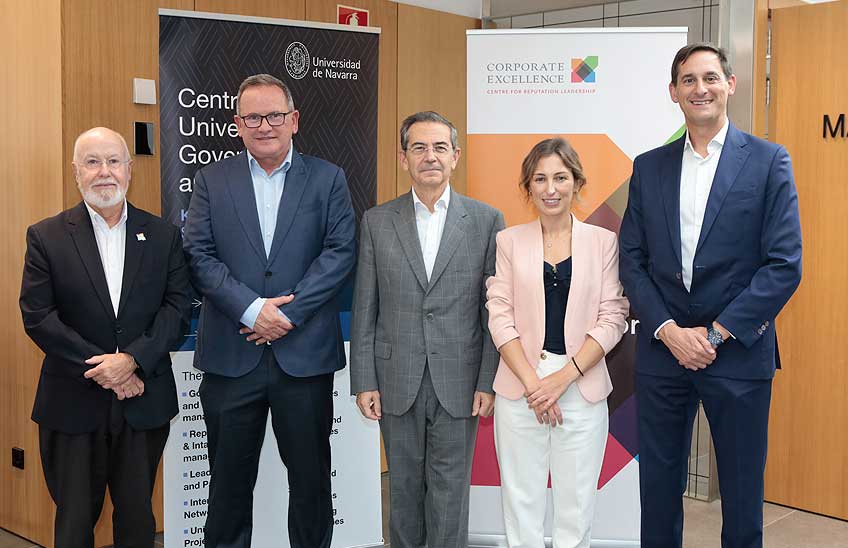Connecting with stakeholders, core topic to boost corporate and university reputation
200 experts from more than 20 countries participate in the International Reputation Week, organized by the University and Corporate Excellence.

PhotoJoséJuan Rico/From left to right Ángel Alloza, Eduardo Navarro, Juan Manuel Mora, Clara Fontán and Santiago Fernández-Gubieda during the inauguration of the International Reputation Week.
03 | 10 | 2023
Spanish universities and all organizations as a whole are going through complicated times derived from a changing social identity, a complex economic cycle and a constantly changing technology. In order to successfully overcome all their challenges and build a solid reputation, it is essential to listen to stakeholders and carry out an appropriate management of the intangible elements of the organization. This was made clear at the International Reputation Week, which began at campus in Madrid at the University of Navarra, organized jointly by this university and the Corporate Excellence-Centre for Reputation Leadership.
The congress, the first of its kind to be held in our country, brings together from today until the 6th of this month more than 200 experts from over 20 countries, representatives of entities from sectors such as universities, banking, mobility, electricity, infrastructure, consultancy service, communication, Education or health, with the goal to deepen and share experiences of governance, reputation and intangible management.
During the opening ceremony, Eduardo Navarro, president of Corporate Excellence, highlighted the direct relationship between reputation, sustainability, business and business excellence, stressing that "we will be better companies to the extent that we listen to and take into account the views of those on whom our social licence depends in order to operate; that is, our stakeholders".
For his part, Full Professor Alfonso Sánchez-Tabernero, of the Center for University Governance and Reputation at the University of Navarra, stressed that reputation is an element core topic to overcome the challenges facing universities, and that "today, building reputation means strengthening identity, being spaces for innovation and knowledge, generating trust among their audiences and facing leadership manager".
Likewise, during the workshop it will be made clear that both universities and any subject of business or entity cannot (or should not) operate in isolation and disconnected from the reality that surrounds them. And therein lies the importance of carrying out an adequate management of all the intangible elements of the organization, as the only way to introduce the expectations and assessments of the stakeholders in the decision making process, as well as to promote mechanisms for the continuous improvement of the entity.
Fifty speakers share their best practices
Among the fifty or so speakers, academics and professionals who will share best practices in corporate and university reputation over the course of these four days are Paul Andrew, Vice President of Communication at Harvard University; John Tomasi, President of the American association Heterodox Academy; Kirsty Walker, Vice President of University College London; Bárbara Navarro, director of research, Public Policy and Institutional Relations at Banco Santander; Beatriz Corredor, president of Redeia; María Such, director of Reputation at BBVA; María Luisa de la Peña, director of Corporate Marketing and Branding at Naturgy; and Jordi Canals, president of the Center for Corporate Governance at the IESE Business School of the University of Navarra.
The congress has the sponsorship of Telefónica and Santander as gold sponsors, DKV and LLYC -as silver sponsors-, Reputation Lab and Trust Maker as bronze sponsors, as well as the partnership of CRUE Spanish Universities, CYD Foundation, European Foundation Society and Education, and World 100 Reputation Network.
